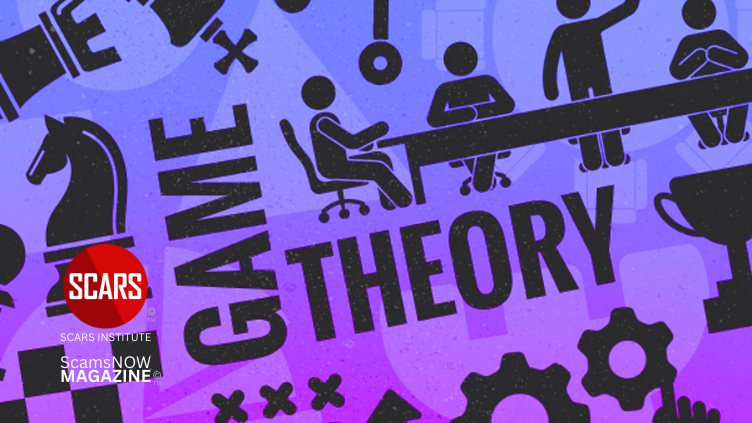Game Theory and Online Scams
Understanding and Reducing the Risks of Online and Phones Scams
Subtitle
Primary Category: Mechanics of Scams
Author:
• Tim McGuinness, Ph.D., DFin, MCPO, MAnth – Anthropologist, Scientist, Polymath, Director of the Society of Citizens Against Relationship Scams Inc.
About This Article
Game theory provides valuable insights into the strategies used by both scammers and potential victims in online scams.
Scammers manipulate their targets through urgency, deception, and emotional exploitation to maximize their gains. Victims, on the other hand, are in a position of uncertainty and must decide whether the situation is legitimate or fraudulent. By applying game theory principles, victims can develop strategies such as increasing skepticism, verifying information, delaying decisions, and focusing on long-term risks rather than short-term gains.
This approach helps individuals better navigate the strategic “game” of online scams, reducing their vulnerability to fraud.

Game Theory and Online Scams: Understanding and Reducing Risk
Game theory, a mathematical framework used to analyze strategic interactions between rational decision-makers, can offer valuable insights into the world of online scams. It examines how individuals make choices based on the anticipated actions of others, which is particularly relevant when considering the strategies used by scammers and how potential victims can respond. By applying game theory to online scams, we can better understand the dynamics at play and identify strategies to reduce the risk of falling victim to scams.
Game Theory & Online Scams
In an online scam, both the scammer and the potential victim are participants in a strategic game, with each party trying to achieve their desired outcome. For scammers, the goal is to manipulate victims into giving up personal information, money, or other resources. For the potential victim, the goal is to avoid falling into the scammer’s trap. Each participant is aware that their actions affect the other’s decisions, making game theory an ideal lens to analyze these interactions.
Scammers often rely on deception, urgency, and psychological manipulation to increase the likelihood of success. They exploit weaknesses in human decision-making, such as emotional vulnerabilities, cognitive overload, or trust. Victims, on the other hand, must decide whether to trust or reject the scammer’s offer based on limited information, making them susceptible to the scammer’s strategic moves.
Game theory identifies these interactions as a form of “zero-sum game,” where one party’s gain (the scammer) comes at the expense of the other party’s loss (the victim). In such scenarios, understanding the motives, strategies, and potential responses of both sides becomes crucial to navigating the game.
Scammer’s Strategy: The ‘Payoff’ for Deception
Scammers often calculate their moves based on maximizing their payoff with minimal effort. They know that they cannot fool everyone, but by targeting a large enough audience, they can trick a certain percentage of individuals. The scammer’s strategy is based on the probability that at least some recipients will respond favorably to their deceptive tactics. From phishing emails to romance scams, scammers rely on creating a situation where victims perceive more benefit in responding or engaging with the scam than in ignoring it.
In this “game,” scammers manipulate the situation by:
Creating urgency (e.g., “You must act now to claim your prize!”)
Exploiting trust (e.g., impersonating a legitimate authority figure or brand)
Preying on emotions (e.g., using fear, greed, or compassion)
From a game theory perspective, these tactics are designed to create a skewed perception of the available choices, making it seem like engaging with the scammer offers the highest payoff (e.g., winning money, avoiding legal trouble).
Victim’s Strategy: Avoiding the Trap
The potential victim is in a position of uncertainty, forced to decide whether the situation is legitimate or a scam. This decision is made based on the information provided by the scammer and the victim’s own knowledge and experience.
From a game theory perspective, the victim’s strategy should be focused on reducing uncertainty and increasing the accuracy of their decision-making. Here’s how game theory helps us understand this process:
Minimizing Risk: Victims can reduce their risk by gathering more information before making a decision. This could involve verifying the legitimacy of the sender, cross-checking offers or requests, and understanding common scam tactics.
Reframing the Payoff: Victims should reframe the scammer’s supposed “payoff.” For example, instead of seeing potential gain (like winning money), they can recognize the likelihood of losing (e.g., falling into a scam).
Considering the Long-Term Consequences: In many scams, victims are encouraged to focus on short-term gains, ignoring the long-term risks. By focusing on the potential negative outcomes (e.g., financial loss, identity theft), the victim can make a more informed decision.
Equilibrium in Scam Scenarios
In game theory, Nash equilibrium occurs when both players in the game make optimal decisions based on the other player’s expected actions. In an online scam scenario, equilibrium can be reached when the scammer knows their tactics are likely to succeed (e.g., by preying on a victim’s emotions), and the victim knows they are being manipulated (e.g., by recognizing the signs of a scam).
For a potential victim, reaching a form of equilibrium involves developing critical thinking and skepticism toward unexpected offers or requests. The goal is to avoid making impulsive decisions based on the scammer’s manipulation tactics. Once victims recognize the predictable tactics used by scammers, they can adopt counter-strategies to protect themselves, disrupting the scammer’s desired equilibrium.
Reducing the Risk of Scams: Lessons from Game Theory
Game theory provides several practical strategies for reducing the risk of falling victim to online scams:
Increase Awareness and Education: Understanding how scams work is the first step toward minimizing risk. Awareness programs that teach people about the tactics scammers use (e.g., urgency, emotional manipulation) make it easier to recognize and avoid scams.
Verify and Gather Information: Before making decisions, victims should seek to gather more information and verify the authenticity of the request. In game theory terms, this reduces the uncertainty that scammers rely on to succeed.
Develop a Skeptical Mindset: Victims who approach unexpected offers or requests with skepticism are less likely to fall for scams. By questioning the payoff that scammers promise and focusing on potential risks, individuals can make more informed decisions.
Delay Decision-Making: Scammers often create a false sense of urgency, pressuring victims to act quickly. Game theory suggests that delaying decision-making allows time for rational thought and reduces the likelihood of falling into the scammer’s trap.
Create Barriers to Entry: Just as scammers try to lower the barriers for victims (e.g., making payment processes quick and easy), potential victims can create their own barriers to entry. For instance, using multi-factor authentication, strong passwords, or limiting the sharing of personal information makes it harder for scammers to succeed.
Conclusion
Game theory offers a useful framework for understanding the dynamics between scammers and potential victims. By recognizing scams as strategic games in which both parties make decisions based on the other’s anticipated actions, we can develop more effective strategies for avoiding fraud. Whether by delaying decision-making, gathering more information, or adopting a skeptical mindset, individuals can reduce their vulnerability to online scams. Ultimately, being aware of the tactics scammers use—and responding thoughtfully—helps to protect against manipulation in this complex game.
-/ 30 /-
What do you think about this?
Please share your thoughts in a comment below!
Statement About Victim Blaming
SCARS Institute articles examine different aspects of the scam victim experience, as well as those who may have been secondary victims. This work focuses on understanding victimization through the science of victimology, including common psychological and behavioral responses. The purpose is to help victims and survivors understand why these crimes occurred, reduce shame and self-blame, strengthen recovery programs and victim opportunities, and lower the risk of future victimization.
At times, these discussions may sound uncomfortable, overwhelming, or may be mistaken for blame. They are not. Scam victims are never blamed. Our goal is to explain the mechanisms of deception and the human responses that scammers exploit, and the processes that occur after the scam ends, so victims can better understand what happened to them and why it felt convincing at the time, and what the path looks like going forward.
Articles that address the psychology, neurology, physiology, and other characteristics of scams and the victim experience recognize that all people share cognitive and emotional traits that can be manipulated under the right conditions. These characteristics are not flaws. They are normal human functions that criminals deliberately exploit. Victims typically have little awareness of these mechanisms while a scam is unfolding and a very limited ability to control them. Awareness often comes only after the harm has occurred.
By explaining these processes, these articles help victims make sense of their experiences, understand common post-scam reactions, and identify ways to protect themselves moving forward. This knowledge supports recovery by replacing confusion and self-blame with clarity, context, and self-compassion.
Additional educational material on these topics is available at ScamPsychology.org – ScamsNOW.com and other SCARS Institute websites.
-/ 30 /-
What do you think about this?
Please share your thoughts in a comment below!
Important Information for New Scam Victims
- Please visit www.ScamVictimsSupport.org – a SCARS Website for New Scam Victims & Sextortion Victims.
- SCARS Institute now offers its free, safe, and private Scam Survivor’s Support Community at www.SCARScommunity.org – this is not on a social media platform, it is our own safe & secure platform created by the SCARS Institute especially for scam victims & survivors.
- SCARS Institute now offers a free recovery learning program at www.SCARSeducation.org.
- Please visit www.ScamPsychology.org – to more fully understand the psychological concepts involved in scams and scam victim recovery.
If you are looking for local trauma counselors, please visit counseling.AgainstScams.org
If you need to speak with someone now, you can dial 988 or find phone numbers for crisis hotlines all around the world here: www.opencounseling.com/suicide-hotlines
Statement About Victim Blaming
Some of our articles discuss various aspects of victims. This is both about better understanding victims (the science of victimology) and their behaviors and psychology. This helps us to educate victims/survivors about why these crimes happened and not to blame themselves, better develop recovery programs, and help victims avoid scams in the future. At times, this may sound like blaming the victim, but it does not blame scam victims; we are simply explaining the hows and whys of the experience victims have.
These articles, about the Psychology of Scams or Victim Psychology – meaning that all humans have psychological or cognitive characteristics in common that can either be exploited or work against us – help us all to understand the unique challenges victims face before, during, and after scams, fraud, or cybercrimes. These sometimes talk about some of the vulnerabilities the scammers exploit. Victims rarely have control of them or are even aware of them, until something like a scam happens, and then they can learn how their mind works and how to overcome these mechanisms.
Articles like these help victims and others understand these processes and how to help prevent them from being exploited again or to help them recover more easily by understanding their post-scam behaviors. Learn more about the Psychology of Scams at www.ScamPsychology.org
SCARS INSTITUTE RESOURCES:
If You Have Been Victimized By A Scam Or Cybercrime
♦ If you are a victim of scams, go to www.ScamVictimsSupport.org for real knowledge and help
♦ SCARS Institute now offers its free, safe, and private Scam Survivor’s Support Community at www.SCARScommunity.org/register – this is not on a social media platform, it is our own safe & secure platform created by the SCARS Institute especially for scam victims & survivors.
♦ Enroll in SCARS Scam Survivor’s School now at www.SCARSeducation.org
♦ To report criminals, visit https://reporting.AgainstScams.org – we will NEVER give your data to money recovery companies like some do!
♦ Follow us and find our podcasts, webinars, and helpful videos on YouTube: https://www.youtube.com/@RomancescamsNowcom
♦ Learn about the Psychology of Scams at www.ScamPsychology.org
♦ Dig deeper into the reality of scams, fraud, and cybercrime at www.ScamsNOW.com and www.RomanceScamsNOW.com
♦ Scam Survivor’s Stories: www.ScamSurvivorStories.org
♦ For Scam Victim Advocates visit www.ScamVictimsAdvocates.org
♦ See more scammer photos on www.ScammerPhotos.com
You can also find the SCARS Institute’s knowledge and information on Facebook, Instagram, X, LinkedIn, and TruthSocial
Psychology Disclaimer:
All articles about psychology and the human brain on this website are for information & education only
The information provided in this and other SCARS articles are intended for educational and self-help purposes only and should not be construed as a substitute for professional therapy or counseling.
Note about Mindfulness: Mindfulness practices have the potential to create psychological distress for some individuals. Please consult a mental health professional or experienced meditation instructor for guidance should you encounter difficulties.
While any self-help techniques outlined herein may be beneficial for scam victims seeking to recover from their experience and move towards recovery, it is important to consult with a qualified mental health professional before initiating any course of action. Each individual’s experience and needs are unique, and what works for one person may not be suitable for another.
Additionally, any approach may not be appropriate for individuals with certain pre-existing mental health conditions or trauma histories. It is advisable to seek guidance from a licensed therapist or counselor who can provide personalized support, guidance, and treatment tailored to your specific needs.
If you are experiencing significant distress or emotional difficulties related to a scam or other traumatic event, please consult your doctor or mental health provider for appropriate care and support.
Also read our SCARS Institute Statement about Professional Care for Scam Victims – click here
If you are in crisis, feeling desperate, or in despair, please call 988 or your local crisis hotline – international numbers here.
More ScamsNOW.com Articles
A Question of Trust
At the SCARS Institute, we invite you to do your own research on the topics we speak about and publish. Our team investigates the subject being discussed, especially when it comes to understanding the scam victims-survivors’ experience. You can do Google searches, but in many cases, you will have to wade through scientific papers and studies. However, remember that biases and perspectives matter and influence the outcome. Regardless, we encourage you to explore these topics as thoroughly as you can for your own awareness.















![NavyLogo@4x-81[1] Game Theory and Online Scams - 2024](https://scamsnow.com/wp-content/uploads/2025/04/NavyLogo@4x-811.png)










![scars-institute[1] Game Theory and Online Scams - 2024](https://scamsnow.com/wp-content/uploads/2025/04/scars-institute1.png)

![niprc1.png1_-150×1501-1[1] Game Theory and Online Scams - 2024](https://scamsnow.com/wp-content/uploads/2025/04/niprc1.png1_-150x1501-11.webp)